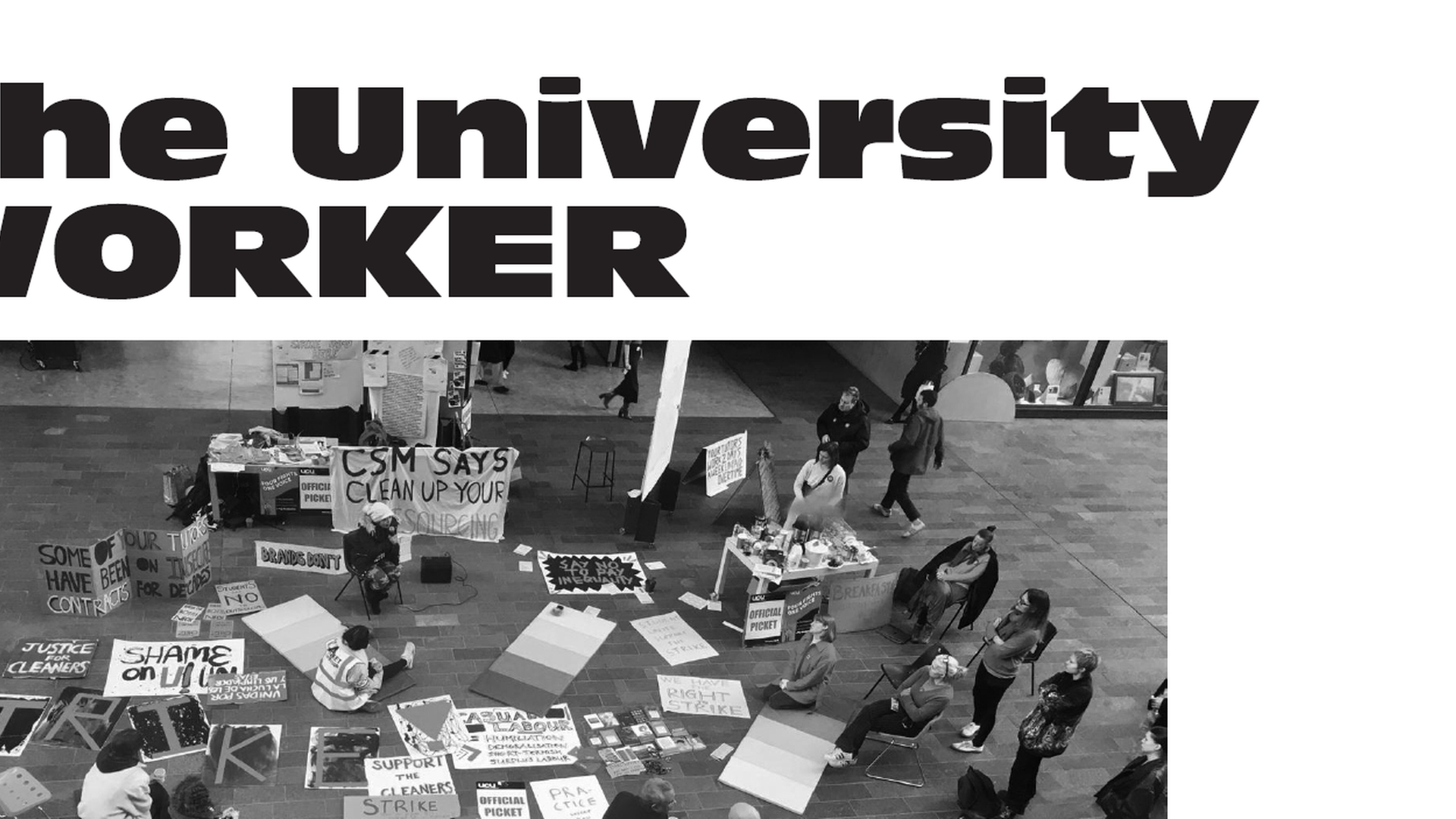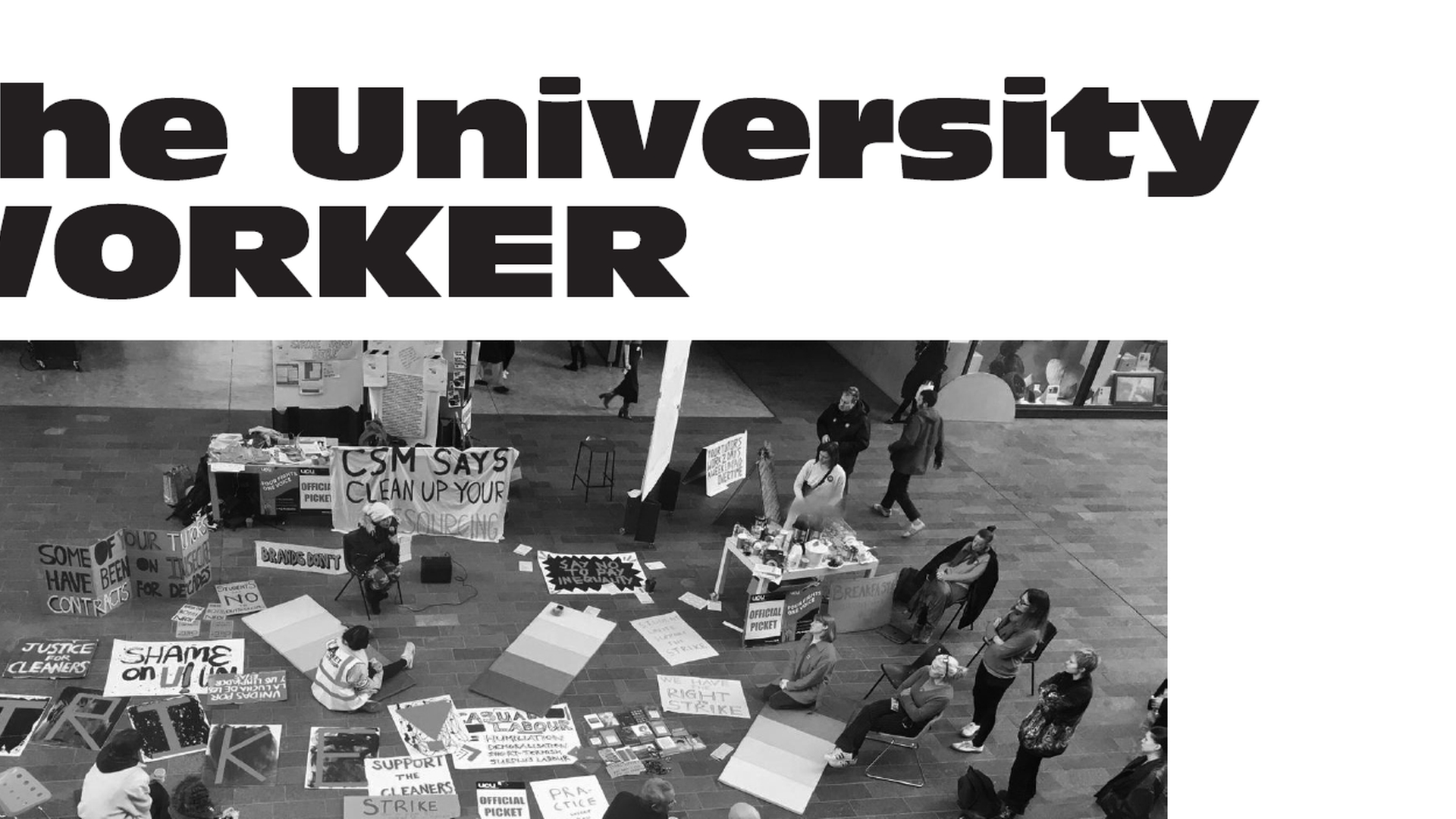What next for UCU during COVID-19?

bulletins
What next for UCU during COVID-19?
by
The University Worker
/
May 18, 2020
Responding to the UCEA offer sent out on the 15th of May
This is an anonymous contribution from a UCU activist submitted to the University Worker
On the 15th of May, UCU issued a statement to its members with an updated settlement proposal put forward by the Universities & Colleges Employers Association (UCEA). The actual offer was put forward to negotiators on the 1 April as part of the 2019/20 Pay and Equalities Dispute – the so-called Four Fights dispute. This offer, which was communicated to the membership 6 and half weeks after it was initially passed to negotiators, is a revision of the proposal that the employers originally tabled in January. The rejection of the January offer, which was preceded by 8 days of strike action in November and December, resulted in a further 14 days of strike action throughout February and March.
Conspicuously absent in the most recent offer is any movement by the employers on the main concern that was advanced by the negotiating team in January. Previously, this led the union to reject the offer and for further strike action. Their main objection was that while UCEA had come far to formulate a set of sector-wide recommendations and expectations to the non-pay issues on the ballot (casualisation, workload and gender and BME pay gap), there was nothing in the wording of the offer that indicated that any of the proposed measures were enforceable. In response, the negotiators proposed that a mechanism be attached to the existing recommendations by which the implementation of these sector-wide expectations could be superintended by UCU nationally and locally.
The new offer makes no mention of this mechanism, meaning, if accepted, it would ultimately be left to individual university managers to honour the program of expectations laid out in the proposal. Given how university managers have acted so far, there is no reason to believe they would carry out these changes without any leverage or accountability being exerted on them. The three-page briefing notes that accompanied the proposal settlement give a brief acknowledgement of this shift:
Throughout negotiations, UCEA have insisted that they would not agree or enforce any specific commitments regarding the three non-pay areas of the dispute that would apply across the whole sector. Our Four Fights negotiators therefore chose to push instead for an alternative type of deal which UCEA said they would be willing to sign up to: namely, a set of sector-wide ‘expectations’ and ‘recommendations’ for employers to follow.
By any estimation this is a bad deal. It indicates the considerably weakened position that the union finds itself in, faced with one of the biggest crises to hit the sector in recent history. There is no doubt that the current context has taken the wind out of the sails of the union’s growing strength – priorities have shifted, and the disarray of the dual ballot strategy has come into relief. How do we pick up the threads of a struggle whose main stakeholders face imminent job losses?
If only to better understand our current dilemma, it’s worth revisiting our position prior to the lockdown. Notwithstanding the unprecedented situation we are confronted with, the leaked minutes of the Russell Group Virtual Meeting on Casualisation 25 February 2020 tells us a lot about where employers were at with casualisation before the lockdown. And this tells us a lot about where they are at now. In the minutes, the Russell group leaders openly acknowledged being at risk of losing the ideological battle around casualisation. They said “there is little information in the public domain explaining the need for different contract types and where and how often they are used”, meaning there is no discourse available that explicitly affirms the widespread use of these contracts in any other business context. The reason being: very few businesses want to acknowledge, never mind affirm, the use of insecure contracts. The most pressing issue for employers as regards casualisation therefore was to address this ideological “vacuum” before it opened onto the real possibility “that university critics could be left to shape this agenda, as well as the ‘solutions’ to it.”
Why exactly would it be a bad thing for ‘university critics’ to establish solutions to casualisation? Because without the widespread use of insecure contracts these institutions would be simply unable to remain resilient in the face of financial shocks such as the one we are currently going through. Already in this leaked document the relationship between the need for an ever-present flexible workforce and the management of crisis is spelled out with uncanny prescience:
“Uncertainty around annual financial planning can make it difficult to plan more than a few years in advance, which in turn can make it more difficult to guarantee long-term employment. Clearly issues around Brexit, USS pension contribution increases, the UCU pay and pensions disputes and now potential threats such as Covid-19 add to the challenges.”
UCEA’s refusal to offer any real concessions on the enforcement of anti-casualisation measures makes it clear that employers have no intention of making commitments over the widespread use of insecure contracts. It makes clear that casualisation is an incredibly important sticking point for employers. Like the logistics sector, universities have had to remain lean in the face of an increasingly financialised industry. One of the main ways academic institutions have inoculated themselves against the costs of market fluctuations is by internalising crisis into its employment hierarchy. Casualisation is the externalisation of risk onto an increasingly bloated and highly competitive labour market which in turn allows institutions to retain their operational integrity whether or not student recruitment targets are met. Casualisation means that liabilities are shifted from the budgets of university business managers, and into the lives of temporarily employed teaching staff. The wave of layoffs that is about to hit casualised teaching staff in HE is not an exceptional measure, it is precisely what casualisation is there to do - to streamline institutions so they are prepared and legally entitled to offload staff at very short notice.
As it currently stands, the four fights campaign may seem a lost cause in view of more immediate priorities. Branches have been firefighting the effects of the lockdown from day one; layoffs, recruitment shortfalls, increased workloads, sector wide adoption of dubious online teaching platforms. All this represents the new terrain of struggle in HE. But the rupture of the recent crisis masks the continued relevance of the central demand that has been dropped from the most recent proposal settlement: the imperative to establish a mechanism that allows UCU to shape the agenda of the ever-present crisis of higher education, which is lived most acutely by casualised staff, as well as to determine the ‘solutions’ to it. If we do not pursue this now, we have to be prepared to accept the fact that after the crisis, employers will be poised to shape the agenda of casualisation for the foreseeable future, both ideologically and practically.
Faced with the current crisis, branches are struggling to leverage anything against employers to prevent mass layoffs of casualised staff. Left without strong and practicable guidance from the leadership as to how to respond to immanent redundancies, the #CoronaContract initiative was a galvanising force for many casualised academics and a resource for branches too stretched to work out local motions on the fly. But blanket demands for contract extensions disconnected from particular institutional contexts, and without a strong sector-wide mandate to support it, inevitably makes unilateral rejection an easy recourse for managers. We are seeing this happen already.
Where there have been signs of a more rooted, and consequently, more impactful response to the crisis, are cases where the rank and file have been able to establish commitments from their institutions over furloughing, financial recovery plans, health and safety and remuneration for additional hours worked during the lockdown. While these victories are modest, they illustrate that in spite of the crisis, the base of the union is far from demobilised. Members are working hard to gain short-term concessions to win back time for broader strategic responses to the crisis in the sector. But the major setback of the Coronavirus crisis has made one thing very obvious: branch capacity to hold employers to account over their treatment of casual staff is very weak.
If our perceptions over the four fights campaign have been tempered by the prospect of balloting members for further strike action in the midst of a global pandemic, we should ask who in our union has lost their appetite for fighting this campaign? Is it the vast amounts of casualised teachers who will lose their teaching posts in the immediate term and be launched into an even more contracted job market for an indefinite period of time, is it the rank and file activists who have been working tirelessly throughout the lockdown to defend the future of the sector by rallying to the cause of precarious workers, or is it those members for who the uncertainty of the current phase is a step too close to a reality that is lived by their junior colleagues every term?
The Higher Education Committee will meet on the 27th May to decide whether or not to accept the deal. Their decision will be informed by branch delegates but it will be down to the HEC to make the final decision. The late communication of the proposal settlement to members has given branches too little time to properly examine the intricacies of this situation in depth. From the date of UCU’s email circular, branches have just over a week to make a decision. For that reason, rank and file activists need to confidently and urgently make the case that a rejection of the deal is worth fighting for, that the principles upon which the previous deal was rejected remain as pertinent now as they ever were and that the 14 days of strike action between February and March were not taken in vain.
author
The University Worker
Subscribe to Notes from Below
Subscribe now to Notes from Below, and get our print issues sent to your front door three times a year. For every subscriber, we’re also able to print a load of free copies to hand out in workplaces, neighbourhoods, prisons and picket lines. Can you subscribe now and support us in spreading Marxist ideas in the workplace?
Read next

The University Worker: Week 4, 2020
by
The University Worker
/
March 10, 2020

